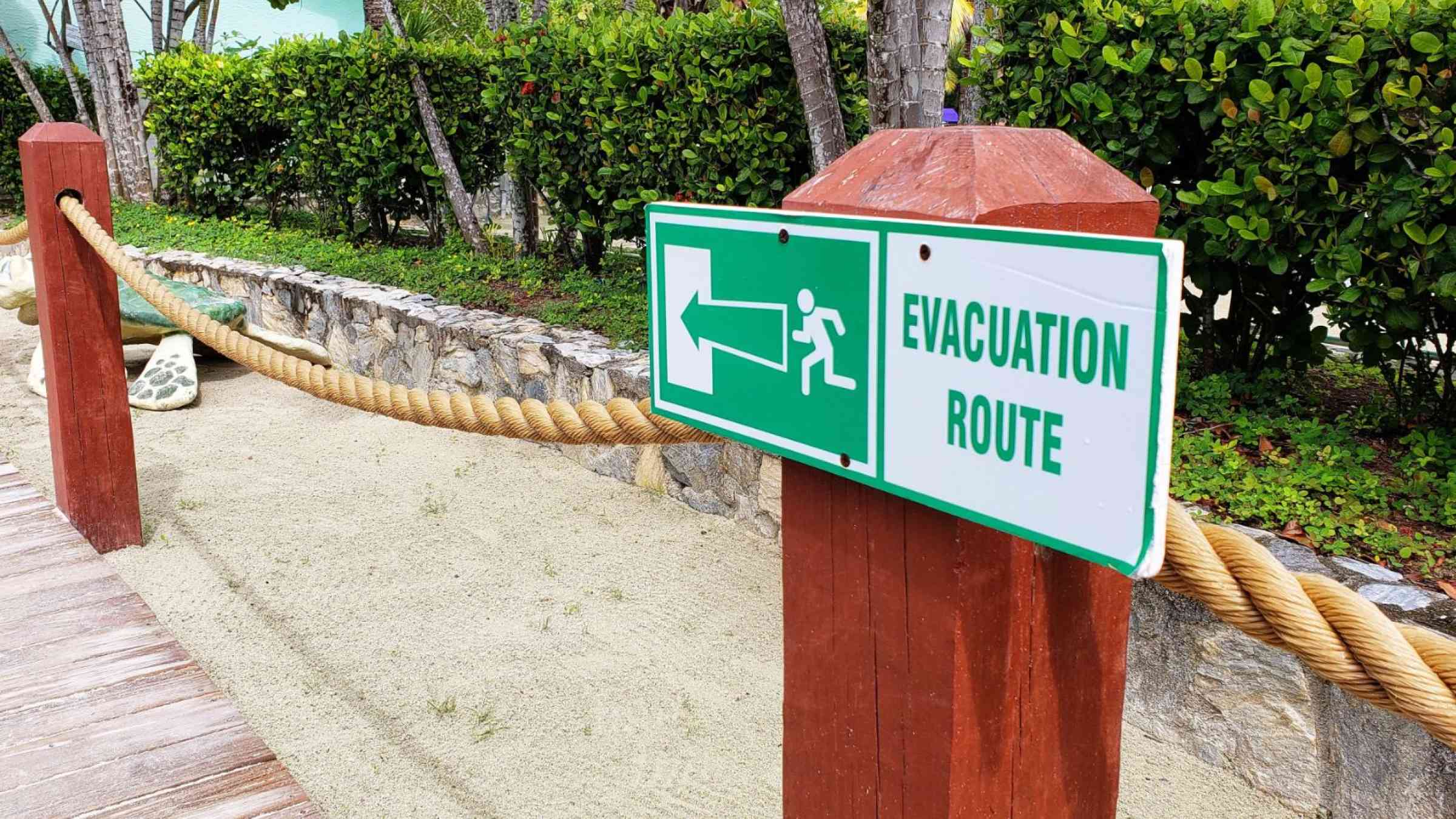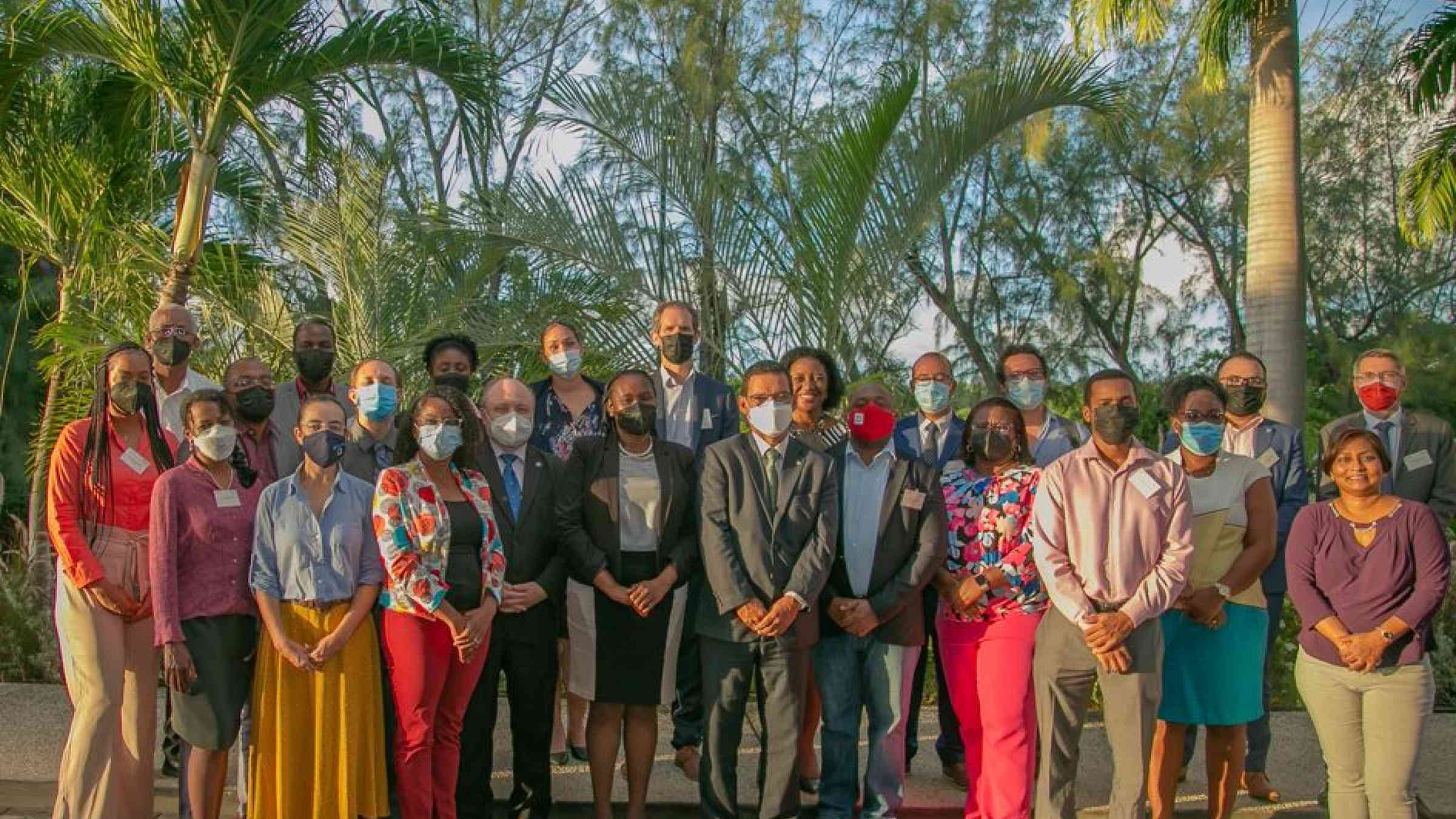Intro
The ‘Caribbean Safe School Initiative’ (CSSI) was launch in April 2017 during the ‘First Caribbean Ministerial Forum on School Safety’. The CSSI is the suggested framework to advance school safety in the Caribbean. The initiative is the Caribbean contribution to the ‘Worldwide-Initiative on Safe Schools (WISS)’ and shall be a partnership for advancing safe school implementation at the national level among Caribbean countries. Ministries of Education will lead the implementation supported by international, regional and national partners.
The CSSI initially supported by the ‘Antigua and Barbuda Declaration’ and reinforced by the June 2022 ’Sint Maarten Declaration on School Safety’, endorsed by 19 countries and territories of the Caribbean. School safety action guiding the commitment to the declaration are guided by the ‘Caribbean Roadmap for School Safety’, a key development during the ‘First Caribbean Ministerial Forum on School Safety’ in 2017, strengthened in 2019 during the ‘Second Caribbean Ministerial Forum on School Safety’ and updated n 2022 during the ‘Third Caribbean Ministerial Forum on School Safety‘.
The ‘Third Caribbean Ministerial Forum on School Safety’ took place in June 2022 in St. Maarten, bringing together 16 countries and overseas territories of the Caribbean, adding one new CSSI member, the Government of the Bahamas, introducing the first integrated edition of the Youth CSSI Forum and producing as its main outcomes the Youth Forum Declaration, the Updated CSSI Roadmap, the Forum Decisions document, and a new Declaration on School Safety.
For more info, please visit CDEMA webpage.
Worldwide Initiative for Safe Schools (WISS):
The Worldwide Initiative for Safe Schools (WISS) is a government-led global partnership for advancing safe school implementation at the national level. The Initiative is coordinated by UNISDR and was developed in collaboration with key partners from the Global Alliance on Disaster Risk Reduction Education and Resilience in the Education Sector
as a response to the High Level Dialogue Communiqué at the 2013 Global Platform for Disaster Risk Reduction.
The Worldwide Initiative for Safe Schools focuses on motivating and supporting Governments to develop national strategies and implement school safety. The Initiative builds on the Comprehensive School Safety Frameworkand
defines a safe school as a school combining all of the following elements:
- Safe Learning Facilities (disaster-resilient infrastructure);
- School Disaster Management; and
- Disaster Risk Reduction and Resilience Education.
The Initiative also promotes good practices and achievements in safe school implementation for replication in other countries and regions, helps identify challenges and offers technical assistance and particular expertise around the three pillars to support interested Governments in implementing school safety at the national level.
Caribbean Ministry of Education are encourage to join the Worldwide Initiative on School Safety.
Documents
Sint Maarten Declaration on School Safety
The Antigua and Barbuda Declaration of 2017 formalised Caribbean countries' commitment to school safety. Since then, significant advancements in school safety have been made at a global and regional level. Furthermore, our understanding of how hazards can impact society through the systemic nature of risk has also evolved. Consequently, the Caribbean school safety approach has become more mindful of comprehensive actions and cross-sectoral work over the years.
To uphold the relevance of the regional commitment to the Caribbean School Safety Initiative, the Third Ministerial Forum yielded the Sint Maarten Declaration on School Safety in the Caribbean. This new Declaration reaffirms the school safety framework of the CSSI to ensure the right to quality and inclusive education for all. It also appraises the regional exposure and vulnerability to natural, biological, anthropogenic, or societal hazards (including various types of violence) that can potentially cause disasters.
The Sint Maarten Declaration on School Safety in the Caribbean explicitly speaks to the need to address the manifestation of the systemic nature of risk and the required joint effort across sectors; it recognises the rising human and financial cost of disasters. The Declaration frames these challenges in the context of Small Island Developing States.
The Declaration reaffirms the recommendations of the Sendai Framework for Disaster Risk Reduction 2015-2030, the Worldwide Initiative on Safe Schools (2013), the Caribbean Comprehensive Disaster Management (CDM) Strategy and Programming Framework 2014-2024, the Samoa Pathway (2014), the Sustainable Development Goals 2015-2030, the Paris Agreement on Climate Change (2015), the post-2020 Global Biodiversity Framework to be adopted at COP 15 in 2022, and other relevant declarations.
It embraces the Comprehensive School Safety Framework and the Caribbean Model Safe School Programme as internationally recognised approaches to reducing the risk of various hazards in the education sector.
ENGLISH
CSSI 3rd Ministerial Forum Declaration
CSSI 3rd Ministerial Forum Decisions
CSSI 3rd Ministerial Forum Roadmap
FRANÇAIS
Déclaration du CSSI du 3ème Forum ministériel
Décisions du CSSI du 3ème Forum ministériel
Feuille du route du CSSI du 3ème Forum ministériel
ESPAÑOL
CSSI Declaración del 3er Foro Ministerial
CSSI Decisiones del 3er Foro Ministerial
CSSI Hoja de ruta del 3er Foro Ministerial
Antigua and Barbuda Declaration on School Safety
In 2017 the Antigua and Barbuda Declaration on School Safety in the Caribbean was signed during the First Caribbean Ministerial Forum on School Safety by 12 Ministries of Education from the following countries and overseas territories: Antigua and Barbuda, Anguilla, Dominica, Dominican Republic, Cuba, Guyana, Montserrat, Saint Kitts and Nevis, Saint Lucia, Saint Vincent and the Grenadines, Turks and Caicos, Virgin Islands.
In 2019, during the Second Ministerial Forum, 6 additional countries and overseas territories adhered to the Antigua and Barbuda Declaration: Curacao, Jamaica, Grenada, Haiti, Suriname and St Maarten.
The key commitments contained in the Declaration are:
- Engage in the multi-stakeholder "Worldwide Initiative for Safe Schools (WISS)", by supporting the implementation of the Comprehensive Safe School Framework and the Model Safe School Programme in the Caribbean for public and private facilities at all levels.
- Build resilience in the education sector.
- Source financial and other resources from the national, regional, and the international community, from public and private sectors, to be channeled towards strengthening efforts in DRR linked to the education sector.
- Coordinate with national and regional disaster management bodies to integrate the tenets of Comprehensive Disaster Management (CDM) into education policies and plans and to ensure alignment with existing national and regional disaster risk reduction and climate change resilience building strategies.
- Strengthen the coordination and cooperation mechanisms among stakeholders at the community, national, regional and international levels.
- Build stronger collaboration among the Ministries of Education in the Caribbean with relevant private sector entities, non-governmental organisations as well as other regional and international entities.
- Define and put in place a framework to track and measure progress on the implementation of the actions identified in the Road Map on School Safety to be authorized by the Minister of Education.
ENGLISH
Antigua And Barbuda Declaration on School Safety in the Caribbean
Annex to the Antigua and Barbuda Declaration on School Safety
FRANÇAIS
Déclaration d'Antigua-et-Barbuda sur la sécurité dans les écoles des Caraïbes
Annexe à la Déclaration d'Antigua-et-Barbuda sur la sécurité dans les écoles
ESPAÑOL
Declaración de Antigua y Barbuda sobre Seguridad Escolar en el Caribe
Anexo a la Declaración de Antigua y Barbuda sobre Seguridad Escolar
Forums & Events
Virtual Pre-Ministerial Forum on School Safety
The CSSI virtual Pre-Ministerial Forum will take the form of four virtual sessions to take place over the three-day period, beginning with a high-level session involving Ministers of Education in the entire Caribbean region. School safety points will have a separate session, as will youth representatives as well as broader stakeholders. To foster increased participation, the youth and stakeholders sessions will be available for the general interested public to listen in.
Broad objectives of the forum include inputs to inform the review of the current CSSI roadmap, promotion of expansion of countries committing to the Sint Maarten Declaration across the Caribbean, sharing of lessons learned from the broad spectrum of stakeholders as well as inputs to set the agenda for the 4th CSSI Ministerial Forum to be held in St. Lucia in 2025.
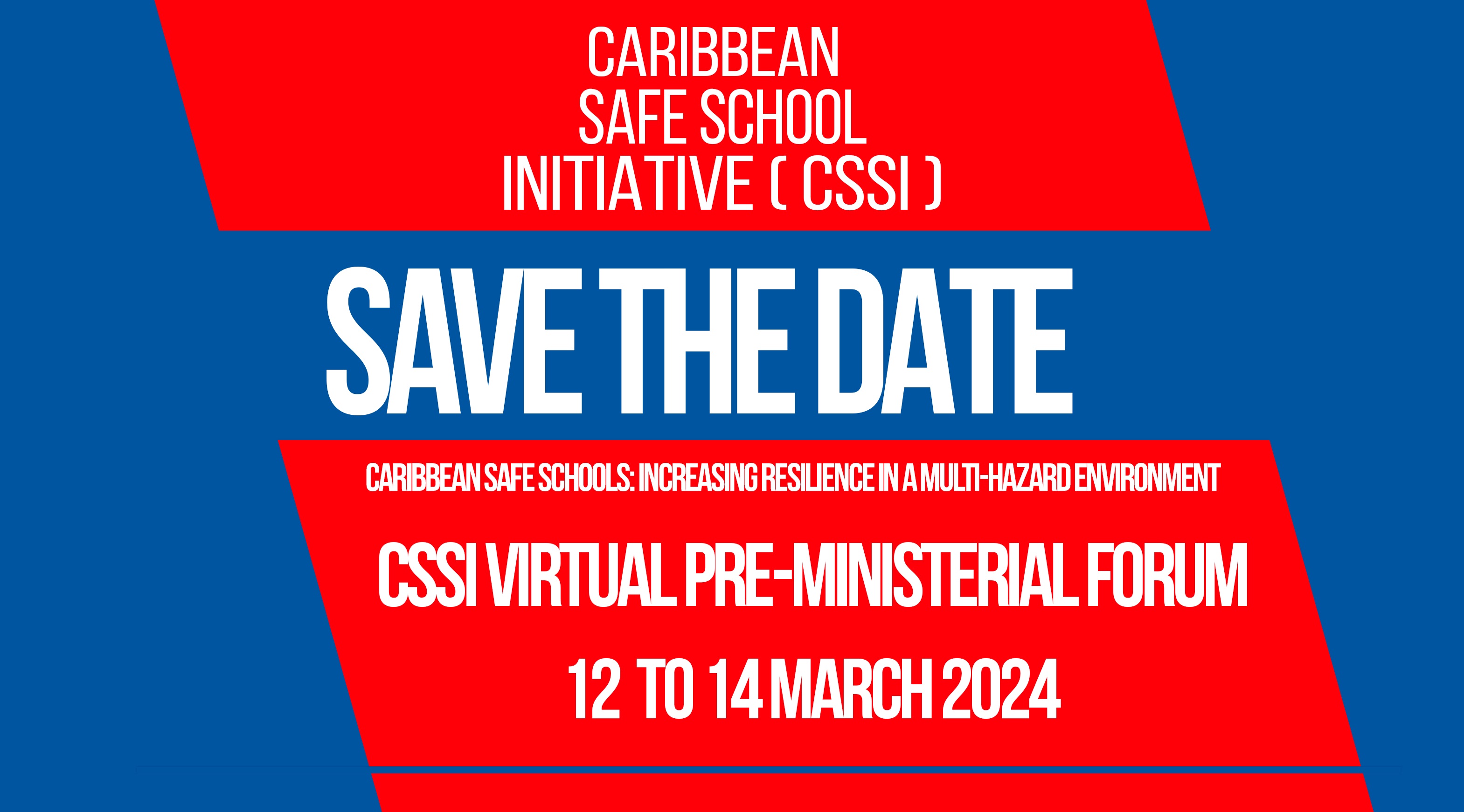
Third Caribbean Ministerial Forum on School Safety
The Third Caribbean Ministerial School Safety Forum was held on 28 to 30 June 2022 in Sint Maarten, hosted by the Ministry of Education, Culture, Youth and Sport of Sint Maarten. Originally scheduled to take place in 2021, the COVID-19 pandemic had the event postponed. The Forum offered the opportunity to reflect upon the changes and challenges the Caribbean has faced since launching the Caribbean Safe School Initiative, mainly the effects of more frequent extreme weather events, such as Hurricane Irma and Maria, or biological hazards, such as COVID-19. It also responded to the need for a collaborative and coordinated approach among actors in the region’s education sector and across other sectors, fostering a systemic approach to risk. The Ministerial Forum linked to the youth forum “My Island, My Voice”, aiming to empower and mobilize Youth to improve school safety, reduce the digital divide, foster child protection, address cyberbullying, and protect the environment.
The event saw the signature of the Sint Maarten Declaration on School Safety in the Caribbean, replacing the Antigua and Barbuda Declaration of 2017. This new Declaration reaffirms the school safety framework of the CSSI to ensure the right to quality and inclusive education for all. It also appraises the regional exposure and vulnerability to natural, biological, anthropogenic, or societal hazards (including various types of violence) that can potentially cause disasters.
The organization of the Forum is possible thanks to the financial support by the Directorate-General for European Civil Protection and Humanitarian Aid Operations (ECHO).
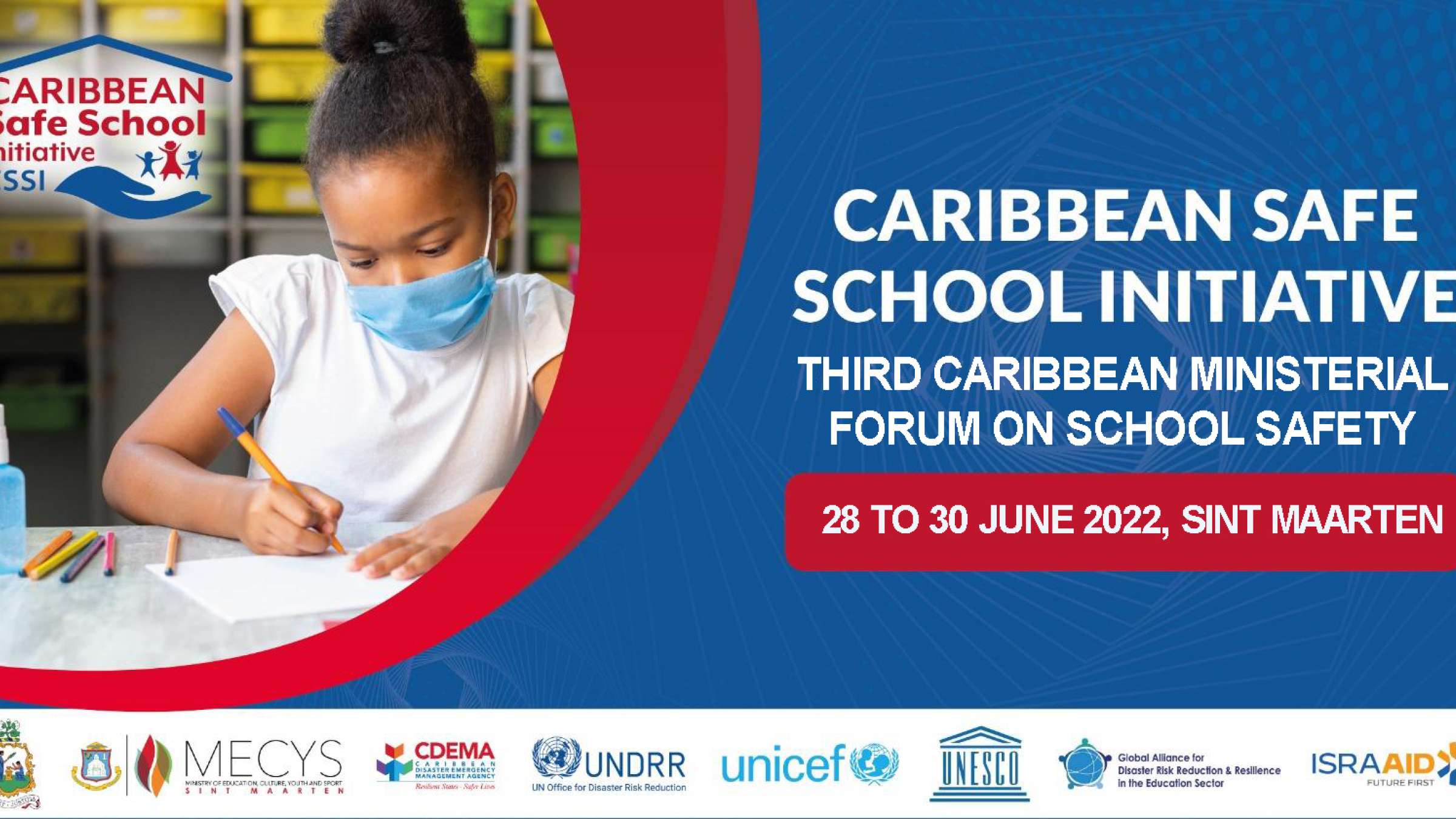
Regional Review on School Safety in the context of Systemic Risk: The Virtual Caribbean Safe School Initiative Pre-Ministerial Forum
The Caribbean Safe School Initiative (CSSI) Virtual Pre-Ministerial Forum opened on March 15, 2021 under the theme Regional Review on School Safety in the context of Systemic Risk. More than 20 countries and territories as well as multilateral agencies and other partners attended the event that addresses the Caribbean’s response to economic, human, natural and health crisis in the education sector.
The organizers of the 10 day event include the Ministries of Education of St. Maarten and St. Vincent & the Grenadines, Caribbean Disaster Emergency Management Agency (CDEMA), the United Nations Office for Disaster Risk Reduction (UNDRR), UNESCO, ISRAAID, and UNICEF.
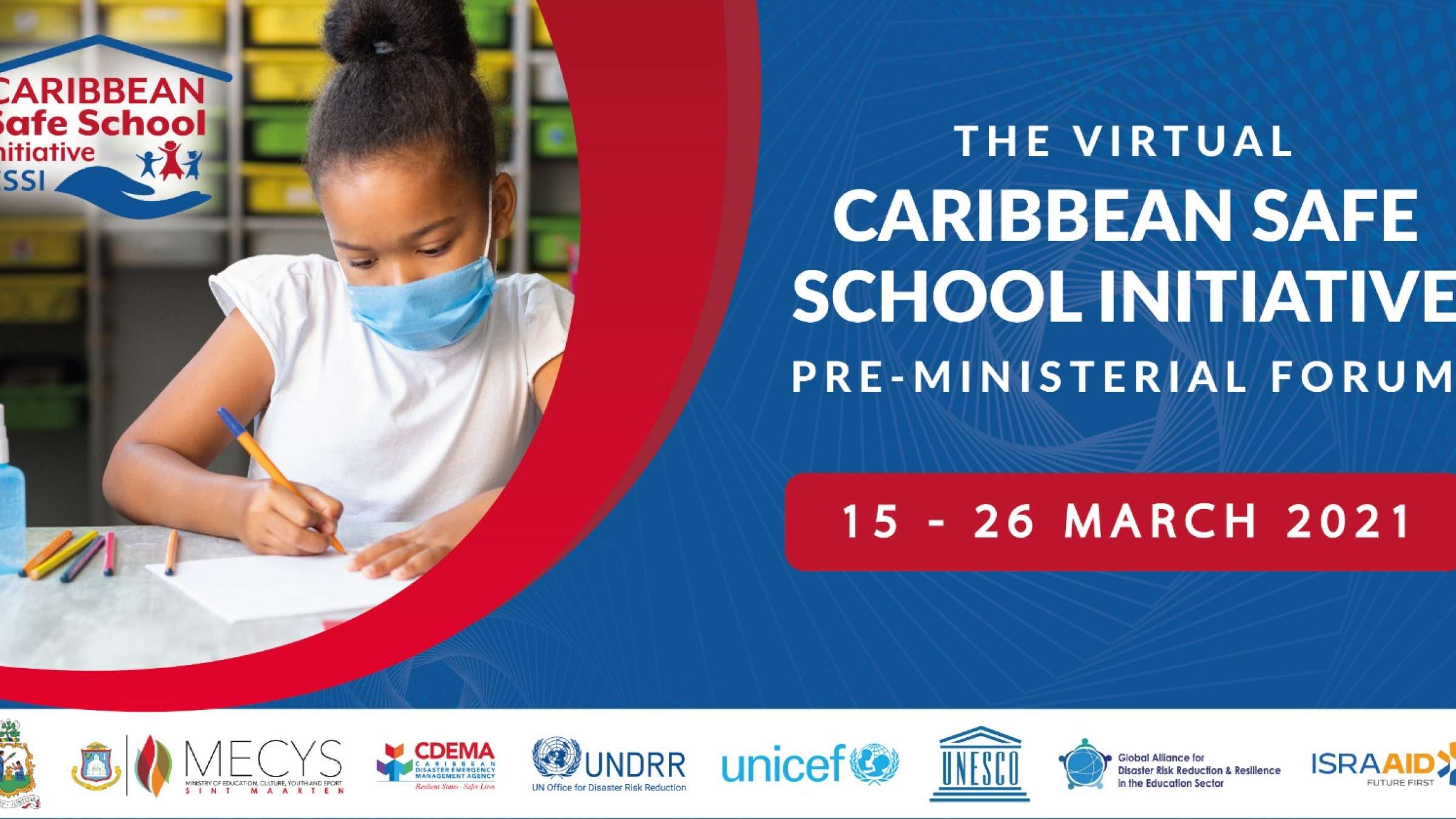
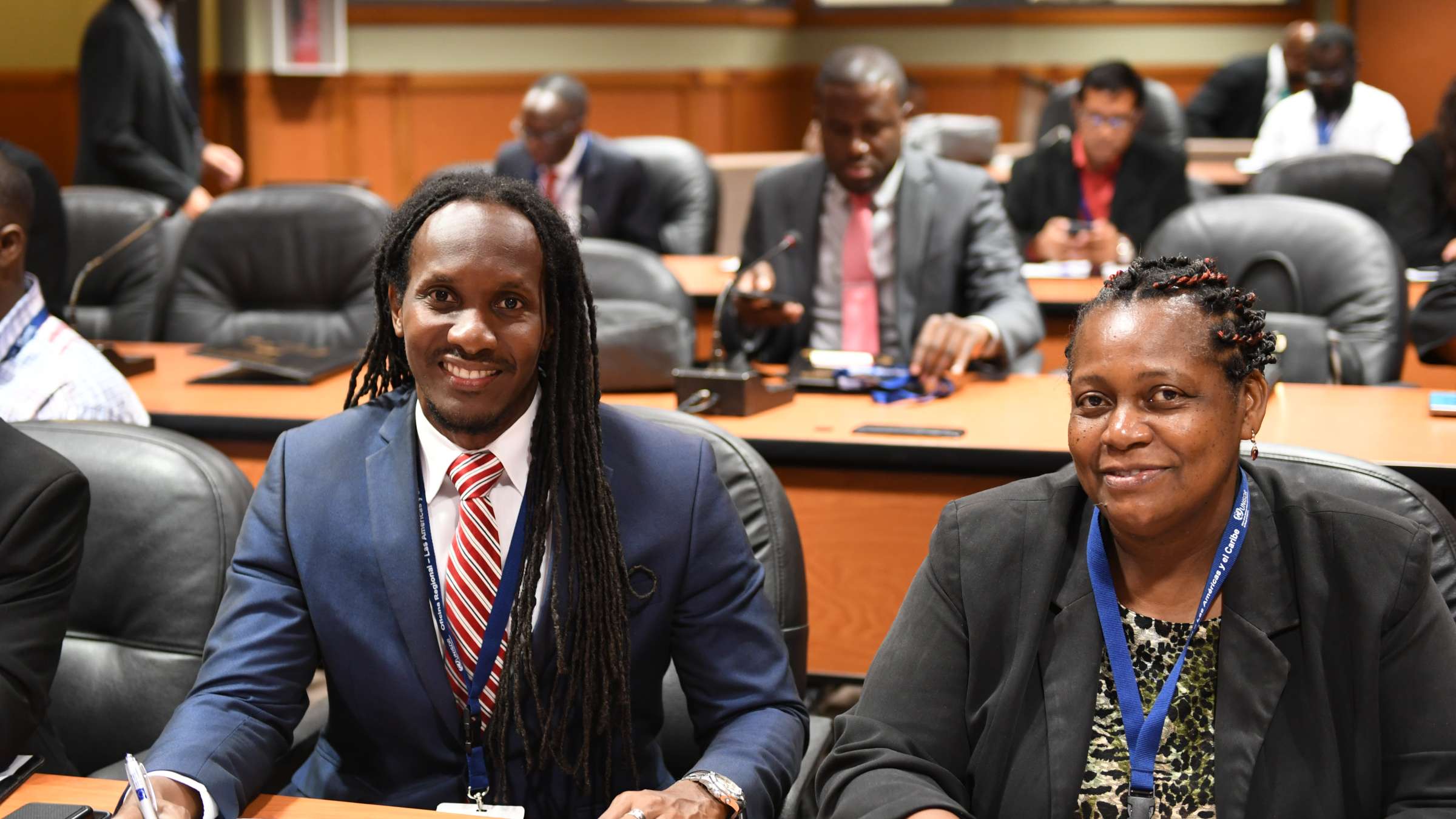
Second Caribbean Ministerial Forum on School Safety
The Second Caribbean Ministerial School Safety Forum was be hosted by the Ministry of Education, National Reconciliation, Ecclesiastical Affairs and Information in Saint Vincent and the Grenadines on 29 and 30 April 2019 in Kingstown. The Forum was organized by the Ministry in close collaboration with the Caribbean Disaster Emergency Management Agency (CDEMA), the United Nations International Children's Emergency Fund (Unicef), the United Nations Office for Disaster Risk Reduction, United Nations Educational, Scientific and Cultural Organization (UNESCO), and the Organization of Eastern Caribbean States (OECS). The organization of the Forum was made possible thanks to the financial support by the Department of the European Commission for Civil Protection and Humanitarian Aid Operations (ECHO).
First Caribbean Ministerial Forum on School Safety
The first Caribbean Safe School Ministerial Forum was held from 3 to 4 April 2017 and hosted by the Ministry of Education, Science and Technology of Antigua and Barbuda. It was organized in collaboration with the Caribbean Disaster Emergency Management Agency (CDEMA), the United Nations International Children's Emergency Fund (Unicef), the United Nations Office for Disaster Risk Reduction (UNISDR), the United Nations Educational, Scientific and Cultural Organization (UNESCO), the Organisation of Eastern Caribbean States (OECS) and the International Federation of Red Cross and Red Crescent Societies (IFRC). The organization of the Forum was possible thanks to the financial support by the Austrian Development Agency, the Kingdom of the Netherlands and South Korea. The Forum targeted Ministers of Education in the Caribbean and their technical advisors, as well as representatives from regional and United Nations organizations, youth, donors and media that will be able to support the implementation of the three pillars of School Safety in the Caribbean.
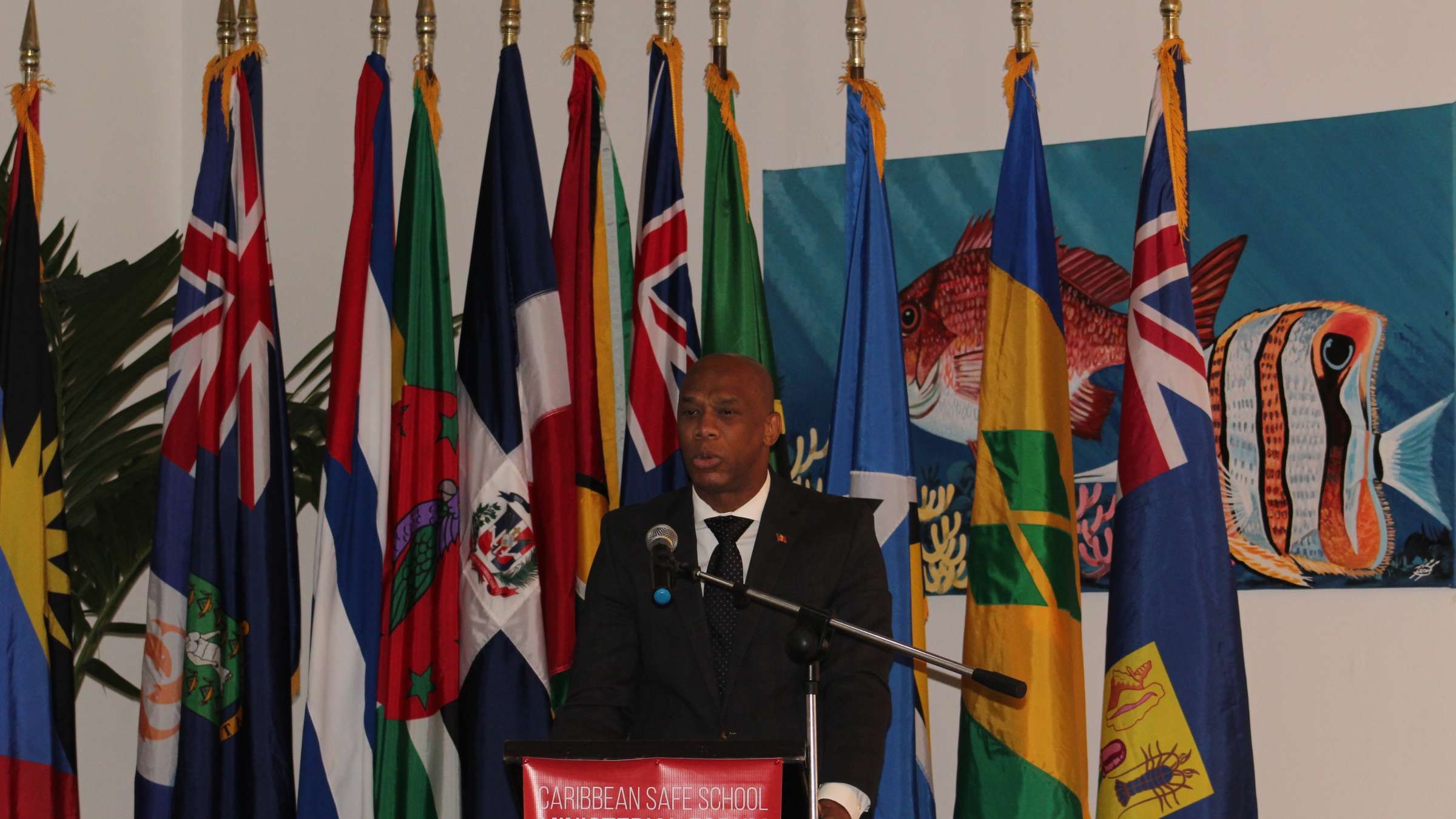
Tools
Technical Support Package for the Caribbean Safe Schools Initiative
With the aim to create synergies and demonstrate which technical support can be provided, partners of the Caribbean Safe School Initiative compiled specific resources and services which can support the implementation of school safety.
These include:
Building an enabling institutional environment
- Comprehensive School Safety Targets and Indicators
- Online Lesson: Introduction to Comprehensive School Safety
- Training Programme on Comprehensive School Safety and Education Sector Policies and Plans - Education Sector Snapshot for CSS and EiE
- Integrating Safety, Resilience and Social Cohesion in Education Sector Planning: Guide for Education Sector Planners and Online Course
- RR&R Policy
Child-Centered Multi-Hazard Assessment
- CSS Assessment Suite (CSS First Step; CSS School Self-Assessment Survey; VISUS –CSS)
Pillar 1 – Safe school Facilities
- Towards Safer School Construction
- Guidance Notes on Safer School Construction
Pillar 2 – School Disaster Management
- Participatory School Disaster Management Resources
- Online Lesson: Introduction to Participatory School Disaster Management
Pillar 3 – Risk Reduction and Resilience Education
- Mainstreaming Disaster Risk Reduction in the School Curricula
- Public Awareness & Public Education – Key Messages
- Safety, Resilience, and Social Cohesion: A Guide for Curriculum Developers
- Education For Sustainable Development Goals: Learning Objectives
- Scope & Sequence for RR&R Curriculum Integration
- Lesson Plans and Informal Activities
TECHNICAL SUPPORT PACKAGE DOWNLOAD
Model Safe School Programme (MSSP)
The Model Safe School Programme (MSSP) is designed to assist CDEMA Participating States with implementing processes that result in safer and greener educational facilities. Its Toolkit comprises a policy that can be adopted by governments and Ministries of Education, tools for assessing the level of safety and greenness of schools, a template Emergency/Disaster Plan that can be adapted to a school's specific situation and hazard context, and, finally, a list of tools and guidance documents that can be utilized to create safer and greener institutions.
The Model Safe School Programme (MSSP) and Toolkit for the Caribbean was endorsed by the CDEMA Council in 2015 as the vehicle through which the region would address school safety. School safety exists in a broader context of enhancing local, national and regional resilience through the mainstreaming of DRM in the education sector.
The overall MSSP training objectives are to: (a) familiarise trainees with the context for the MSSP and the assessment tools, (b) train on the utilization of the tool to assess risk in schools, and (c) train on the preparation of assessment reports.
The MSSP assessment consists of the three tools, namely the (a) Questionnaire for the School Safety Compliance Standards, the (b) Building Condition Assessment, and the (c) Green Assessment.
The following countries undertook the Model Safe School Programme Training in 2017:Saint Lucia, Saint Kitts and Nevis, Montserrat, Guyana, Antigua and Barbuda as well as Turks and Caicos Islands.
Interested in applying the MSSP training? Download the package here.
Good Practices
Contact us
#112 Luis Bonilla Street
City of Knowledge
Clayton, Ancon
0843-03441 Panama City, Panama
E-mail: [email protected]
Phone: +507 317 1120
Fax: +507 317 0600
www.undrr.org/about-undrr-where-we-work/americas

